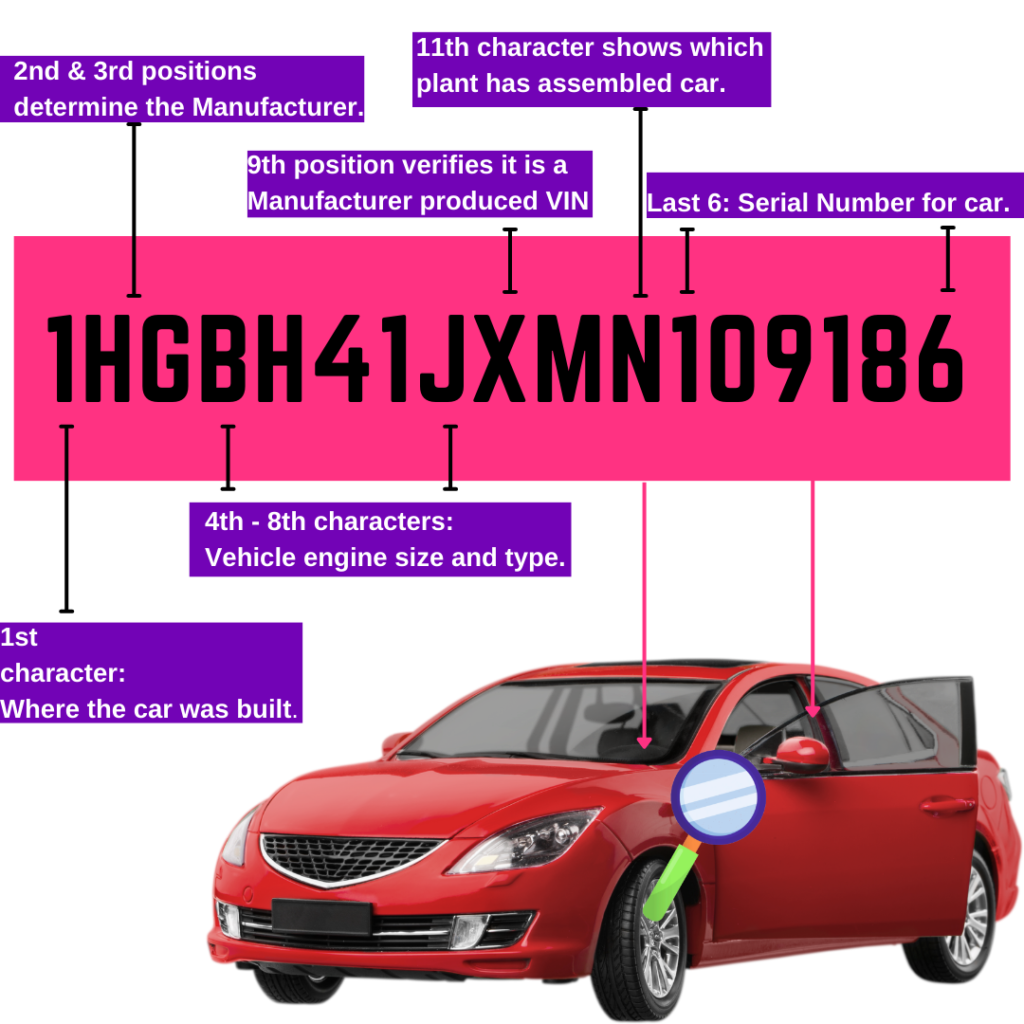By Chuck Sabo | 12/30/22
What is a VIN or Vehicle Identification Number?
A Vehicle Identification Number (VIN) is a unique 17-character code that is assigned to every motor vehicle when it is manufactured. The VIN is used to identify and track the vehicle and its ownership history, and it is typically used by various organizations and agencies, including law enforcement and insurance companies, to verify information about the car.
The VIN may reveal information about the car’s factory options, trim level, and manufacturing location, as well as any accidents or other events that have been reported to the authorities. It can be used to track the service history of the car by the Manufacturer as well as tracking the car during shipping from the Manufacturer to the Dealership.
Where is the VIN located on my car?
The Vehicle Identification Number (VIN) of a car is typically located in several places on the vehicle itself, as well as on documents related to the car, such as the title and registration.
On the vehicle itself, the VIN is often found:
On a metal plate on the dashboard, visible through the front windshield on the driver’s side of the car
On a sticker on the driver’s side doorjamb, near the latch
On a sticker in the engine compartment
The VIN may also be found on documents related to the car, such as:
-The car’s title
-The car’s registration
-Insurance documents
If you are having trouble finding the VIN on your car, you can also try consulting the owner’s manual or contacting the manufacturer.

Here you can see where the VIN is located and what the different positions in the VIN mean.
Is it safe to hand out my VIN?
It is generally safe to provide the Vehicle Identification Number (VIN) when selling your car. Providing the VIN to a potential buyer can help them verify the accuracy of the information you have provided about the car and make an informed decision about whether to purchase it. However, it is always a good idea to be cautious when sharing personal information, including your VIN, with anyone.
If you are concerned about sharing your VIN, you can consider redacting all but the last few digits when providing it to a potential buyer. This should still allow them to verify the accuracy of the information you have provided about the car without providing them with your full VIN.
What information does the VIN have that the License Plate doesn’t?
Both the Vehicle Identification Number (VIN) and the license plate of a car can potentially reveal sensitive information about the vehicle and its owner. However, the VIN tends to reveal more detailed and specific information about the car itself, while the license plate may reveal more general information about the owner’s location and registration status.
The license plate, on the other hand, is a unique combination of letters and numbers that is assigned to a specific vehicle and is used to identify and track the car’s registration status and location. The license plate may reveal information about the owner’s state of residence and whether the car is properly registered and insured.
Overall, it is important to be cautious about sharing personal information, including the VIN and license plate of your car, with anyone. Both can potentially be used to access sensitive information about the car and its owner, and it is always a good idea to protect your privacy and security. Keep in mind, though, your local Police Department or other Public Safety official will pull you over and get your info based on your license plate, not your VIN.
Does the company buying my car really need my VIN?
Yes, it is necessary for a car buyer to have the Vehicle Identification Number (VIN) in order to provide an accurate offer for your car.
Having the VIN allows the buyer to accurately assess the value of your car based on its specific characteristics and history. Without the VIN, the buyer may not have access to all of the necessary information to make an accurate offer.
If you are selling your car and are asked to provide the VIN, it is generally safe to do so. The VIN is a commonly used and widely accepted method of identifying and verifying information about a car, and providing it can help the buyer assess the value of your car and make an informed decision about whether to purchase it. However, as always, it is a good idea to be cautious when sharing personal information, including your VIN, with anyone.